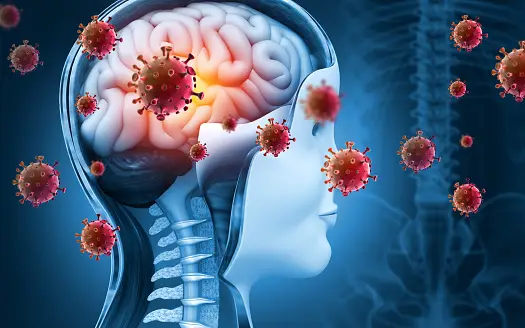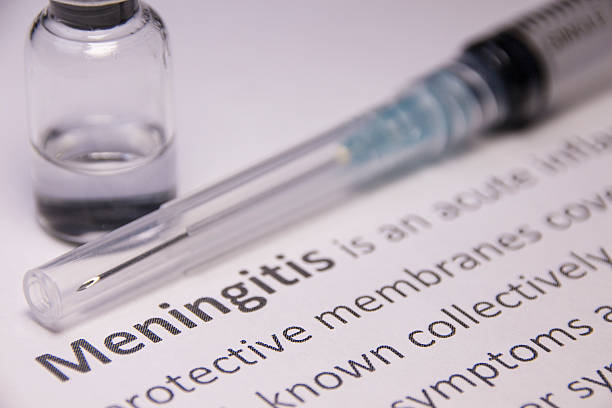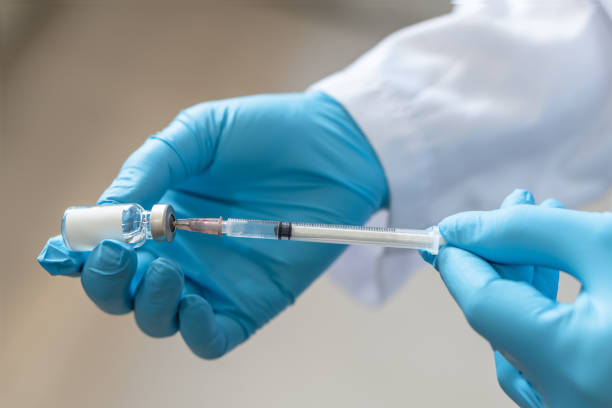Aseptic meningitis is a medical condition characterized by inflammation of the meninges, the protective membranes surrounding the brain and spinal cord. Unlike bacterial meningitis, which is caused by bacterial infection, aseptic meningitis is typically caused by viral infections, although it can also result from fungal infections, medications, autoimmune disorders, or other non-infectious causes.
This condition shares many symptoms with bacterial meningitis, such as headache, fever, sensitivity to light, and neck stiffness, but it lacks the presence of bacteria in the cerebrospinal fluid. Aseptic meningitis often resolves on its own with supportive care, but in some cases, medical intervention may be necessary to manage symptoms and address the underlying cause. Understanding the causes, symptoms, diagnosis, and treatment options for aseptic meningitis is crucial for timely and effective management of this condition.
Table of Contents
Symptoms of Aseptic Meningitis

Aseptic meningitis presents with symptoms similar to bacterial meningitis, but without the presence of bacteria in the cerebrospinal fluid. Here are the common symptoms associated with aseptic meningitis:
- Headache: Often severe and persistent, sometimes worsening with movement or changes in position.
- Fever: Elevated body temperature, typically accompanied by chills or sweating.
- Neck Stiffness: Difficulty bending the neck forward due to inflammation of the meninges.
- Sensitivity to Light (Photophobia): Discomfort or pain when exposed to bright lights or sunlight.
- Nausea and Vomiting: Often occurs as a result of the severe headache and general illness.
- Fatigue: Feeling unusually tired or lethargic, which may persist even with rest.
- Confusion or Disorientation: Difficulty concentrating or changes in mental status, especially in severe cases.
- Skin Rash: In some viral causes, a rash may develop, indicating the underlying viral infection.
- Muscle Aches and Joint Pain: Generalized body aches and discomfort may be present.
- Irritability: Particularly common in children, who may be unusually fussy or difficult to console.
It’s important to note that symptoms can vary in severity and may develop gradually or suddenly. Prompt medical evaluation is essential if you or someone you know experiences symptoms suggestive of meningitis, as early diagnosis and treatment can significantly impact outcomes.
Causes of Aseptic Meningitis
Aseptic meningitis is typically caused by viral infections, but it can also result from non-infectious causes. Here are the primary causes of aseptic meningitis:
- Viral Infections:
- Enteroviruses: Coxsackievirus, echovirus, and other enteroviruses are common causes of viral meningitis, especially in children and young adults.
- Herpesviruses: Herpes simplex virus (HSV) and varicella-zoster virus (VZV) can cause aseptic meningitis, often associated with symptoms such as rash or genital lesions.
- Arboviruses: Certain mosquito-borne viruses, such as West Nile virus, can lead to meningitis.
- Other Viruses: Influenza viruses, mumps virus, and lymphocytic choriomeningitis virus (LCMV) can also cause aseptic meningitis.
- Non-Infectious Causes:
- Medications: Some drugs, such as nonsteroidal anti-inflammatory drugs (NSAIDs), antibiotics (e.g., penicillin), intravenous immunoglobulin (IVIG), and certain vaccines, can trigger aseptic meningitis as a side effect.
- Autoimmune Disorders: Conditions like systemic lupus erythematosus (SLE), Behçet’s disease, and sarcoidosis can lead to inflammation of the meninges.
- Chemical Irritants: Exposure to certain chemicals or toxins can cause aseptic meningitis.
- Cancers: Leukemia, lymphoma, or metastatic cancers that spread to the meninges can lead to meningitis.
- Bacterial Infections:
- Although less common, some bacterial infections, such as Lyme disease (caused by Borrelia burgdorferi), can present with symptoms resembling aseptic meningitis. However, the cerebrospinal fluid in these cases usually shows a mixed cellular response.
Understanding the specific cause of aseptic meningitis is crucial for determining appropriate treatment and management strategies. Diagnosis often involves testing cerebrospinal fluid obtained through a lumbar puncture (spinal tap) to identify the underlying cause and guide treatment decisions.
Risk Factors
Several factors can increase the risk of developing aseptic meningitis. These risk factors can vary depending on the underlying cause of the condition. Here are some common risk factors associated with aseptic meningitis:
- Viral Infections:
- Season: Certain viruses, like enteroviruses, are more prevalent during summer and early fall, increasing the risk of viral meningitis during these seasons.
- Exposure: Close contact with infected individuals, especially in crowded or institutional settings, can increase the risk of viral transmission.
- Age:
- Children and Young Adults: Viral meningitis, including aseptic meningitis, is more common in children under the age of 5 and young adults due to their developing immune systems and higher exposure rates.
- Health Conditions:
- Weakened Immune System: Individuals with weakened immune systems due to conditions such as HIV/AIDS, cancer, diabetes, or organ transplantation are at higher risk for viral infections that can lead to aseptic meningitis.
- Autoimmune Disorders: Conditions like systemic lupus erythematosus (SLE), rheumatoid arthritis, or sarcoidosis can increase susceptibility to aseptic meningitis.
- Medications and Treatments:
- Certain Drugs: Use of medications such as nonsteroidal anti-inflammatory drugs (NSAIDs), antibiotics (e.g., penicillin), intravenous immunoglobulin (IVIG), or vaccines can occasionally trigger aseptic meningitis as a side effect.
- Environmental Factors:
- Exposure to Chemicals: Certain chemicals or toxins can cause inflammation of the meninges and lead to aseptic meningitis.
- Travel History:
- International Travel: Travel to regions where certain viral infections are more prevalent, such as West Nile virus in tropical or subtropical areas, can increase the risk of acquiring aseptic meningitis.
- Previous Meningitis Episodes:
- Individuals who have had a previous episode of viral meningitis may be at a slightly higher risk of developing the condition again.
Understanding these risk factors can help individuals and healthcare providers identify those at higher risk and take appropriate preventive measures or early intervention strategies when symptoms of aseptic meningitis arise. Prompt medical evaluation and treatment are crucial for managing the condition effectively and preventing potential complications.
Diagnosis

Diagnosing aseptic meningitis involves a combination of clinical evaluation, laboratory tests, and sometimes imaging studies to identify the underlying cause of the inflammation of the meninges. Here’s how aseptic meningitis is typically diagnosed:
- Medical History and Physical Examination:
- Your healthcare provider will begin by taking a detailed medical history, including symptoms, recent illnesses, medications, and any relevant exposures (e.g., travel, environmental factors).
- A thorough physical examination will be conducted to assess symptoms such as neck stiffness, fever, and neurological signs.
- Lumbar Puncture (Spinal Tap):
- A definitive diagnosis of meningitis is often made by analyzing cerebrospinal fluid (CSF) obtained through a lumbar puncture.
- CSF analysis involves examining the fluid for:
- Cell Count: An elevated white blood cell count (pleocytosis) is indicative of meningitis.
- Glucose and Protein Levels: Abnormal levels can provide further clues to the cause of meningitis.
- Microbiological Tests: Tests for bacteria, viruses, and sometimes fungi or other pathogens are conducted to identify the specific cause. This may include PCR (polymerase chain reaction) tests for viral DNA or RNA.
- Blood Tests:
- Blood tests may be performed to check for signs of infection, inflammation, or other underlying conditions that could contribute to meningitis.
- Imaging Studies:
- In some cases, imaging studies such as a CT scan or MRI of the brain may be ordered to rule out other causes of symptoms or to evaluate for complications of meningitis, such as abscesses or swelling.
- Additional Tests:
- Depending on the suspected cause of aseptic meningitis, additional tests may be conducted, such as serological tests for specific viruses (e.g., herpes simplex virus, varicella-zoster virus) or autoimmune markers in cases suspected to be related to autoimmune disorders.
Diagnosing aseptic meningitis can be challenging due to its diverse causes and overlapping symptoms with other types of meningitis. Therefore, a thorough evaluation by healthcare professionals, often involving multiple diagnostic approaches, is essential to determine the appropriate treatment and management plan based on the underlying cause.
Treatment
Treatment for aseptic meningitis depends on the underlying cause and the severity of symptoms. Since aseptic meningitis is typically caused by viral infections and occasionally by other non-infectious factors, the treatment approach focuses on supportive care and managing symptoms. Here’s an overview of treatment options:
- Supportive Care:
- Rest and Fluids: Adequate rest and hydration are essential to help the body recover from the infection and manage symptoms like fever and headache.
- Pain Management: Over-the-counter pain relievers such as acetaminophen (Tylenol) or nonsteroidal anti-inflammatory drugs (NSAIDs) may be recommended to alleviate headache and fever.
- Comfort Measures: Measures to reduce discomfort, such as dimming lights for photophobia or using cool compresses for fever, can be helpful.
- Antiviral Medications:
- In cases where a viral infection is identified as the cause (e.g., herpes simplex virus, varicella-zoster virus), specific antiviral medications may be prescribed to reduce the severity and duration of symptoms. These medications are most effective when started early in the course of illness.
- Corticosteroids:
- Corticosteroids may be considered in certain cases to reduce inflammation of the meninges and alleviate symptoms. However, their use is generally reserved for severe cases or when there is evidence of significant inflammation.
- Antibiotics (in some cases):
- Initially, antibiotics may be administered until bacterial meningitis is definitively ruled out, as the symptoms of aseptic meningitis can overlap with bacterial meningitis. Once bacterial meningitis is excluded, antibiotics are typically discontinued.
- Hospitalization and Monitoring:
- Hospitalization may be necessary for severe cases, especially if there are neurological symptoms or complications.
- Close monitoring of vital signs, neurological status, and response to treatment is important to ensure appropriate management and recovery.
- Treatment of Underlying Conditions:
- If aseptic meningitis is secondary to an underlying condition such as autoimmune disease or medication side effect, addressing the underlying cause is crucial for management.
- Follow-Up Care:
- Regular follow-up visits with healthcare providers are recommended to monitor recovery, manage any ongoing symptoms, and address any potential complications.
It’s important to note that aseptic meningitis often resolves on its own with supportive care and symptomatic treatment. The specific treatment plan will be tailored to the individual’s clinical presentation, underlying cause, and overall health condition. Prompt medical evaluation and appropriate management can help reduce the severity of symptoms and prevent complications associated with aseptic meningitis.
Prevention

Preventing aseptic meningitis primarily involves measures to reduce the risk of viral infections, which are the most common cause of this condition. Here are some preventive strategies:
- Vaccination:
- Routine Vaccinations: Ensure up-to-date vaccinations, including vaccines against viruses that can cause meningitis, such as measles, mumps, rubella (MMR), varicella (chickenpox), and influenza.
- Meningococcal Vaccine: This vaccine protects against bacterial meningitis caused by Neisseria meningitidis and is recommended for adolescents and young adults, especially those living in close quarters (e.g., college dormitories).
- Hand Hygiene:
- Wash hands frequently with soap and water, especially after using the restroom, before eating, and after coughing or sneezing.
- Use alcohol-based hand sanitizers when soap and water are not available.
- Avoid Close Contact with Sick Individuals:
- Limit close contact with individuals who have symptoms of respiratory or gastrointestinal infections, as some viruses can also cause meningitis.
- Practice Respiratory Hygiene:
- Cover your mouth and nose with a tissue or your elbow when coughing or sneezing to prevent the spread of respiratory infections.
- Mosquito Bite Prevention:
- Use insect repellents containing DEET or Picaridin when outdoors in mosquito-prone areas to reduce the risk of mosquito-borne infections like West Nile virus.
- Avoid Sharing Personal Items:
- Avoid sharing eating utensils, drinking glasses, or personal items with others, especially during outbreaks of viral infections.
- Maintain a Healthy Lifestyle:
- Eat a balanced diet, exercise regularly, and get enough sleep to support overall immune function and reduce susceptibility to infections.
- Travel Precautions:
- If traveling to areas where certain viral infections are more common, take precautions such as avoiding mosquito bites and following food and water safety guidelines.
- Stay Informed:
- Stay informed about outbreaks of viral infections in your community or travel destinations and take appropriate precautions.
While some causes of aseptic meningitis cannot be prevented (such as medication-induced or autoimmune-related cases), adopting these preventive measures can significantly reduce the risk of viral infections that lead to aseptic meningitis. If you suspect you or someone you know may have meningitis, seek medical attention promptly for diagnosis and appropriate management. Early intervention can help reduce complications and promote a quicker recovery.
When to Speak With a Medical Professional
It’s important to consult with a medical professional promptly if you experience symptoms suggestive of meningitis or if you have concerns about your health. Here are specific situations when you should seek medical attention:
- Severe Headache: If you have a sudden or severe headache that persists despite over-the-counter pain medications.
- High Fever: A fever of 100.4°F (38°C) or higher, especially if it is accompanied by other symptoms.
- Neck Stiffness: Difficulty bending your neck forward (also known as nuchal rigidity), which may indicate inflammation of the meninges.
- Sensitivity to Light (Photophobia): Discomfort or pain when exposed to bright lights or sunlight.
- Rash: Particularly if the rash is sudden, widespread, or accompanied by other symptoms.
- Confusion or Altered Mental Status: Difficulty concentrating, disorientation, or changes in behavior.
- Seizures: Unexplained seizures or convulsions.
- Nausea and Vomiting: Especially if they are severe or persistent, leading to dehydration.
- Symptoms in Infants and Young Children: In infants, symptoms such as irritability, poor feeding, and a bulging fontanelle (soft spot on the head) may indicate meningitis.
- Recent Travel or Exposure: If you have traveled to areas where meningitis outbreaks are occurring or have been in close contact with someone diagnosed with meningitis.
- Underlying Health Conditions: If you have a weakened immune system due to conditions like HIV/AIDS, cancer, or diabetes, which may increase your risk of infections like meningitis.
- Persistent Symptoms: If you have symptoms that do not improve or worsen over time, despite home care or over-the-counter treatments.
When in doubt, it’s always better to err on the side of caution and seek medical advice. Early diagnosis and prompt treatment are crucial for managing meningitis effectively and minimizing potential complications. If you suspect meningitis or have concerns about your symptoms, contact your healthcare provider or seek urgent medical care.
Conclusion
In conclusion, aseptic meningitis is a condition characterized by inflammation of the meninges, typically caused by viral infections but also influenced by non-infectious factors such as medications or autoimmune diseases. Recognizing the symptoms of meningitis, including severe headache, fever, neck stiffness, and sensitivity to light, is crucial for seeking timely medical attention.
Diagnosis involves thorough evaluation, including a spinal tap to analyze cerebrospinal fluid and determine the underlying cause. Treatment focuses on supportive care, managing symptoms, and addressing the specific cause when identified, such as antiviral medications or corticosteroids. Preventive measures, including vaccination and practicing good hygiene, can help reduce the risk of viral infections that may lead to aseptic meningitis. Overall, early intervention and comprehensive medical management are essential for ensuring the best outcomes for individuals affected by this condition.
